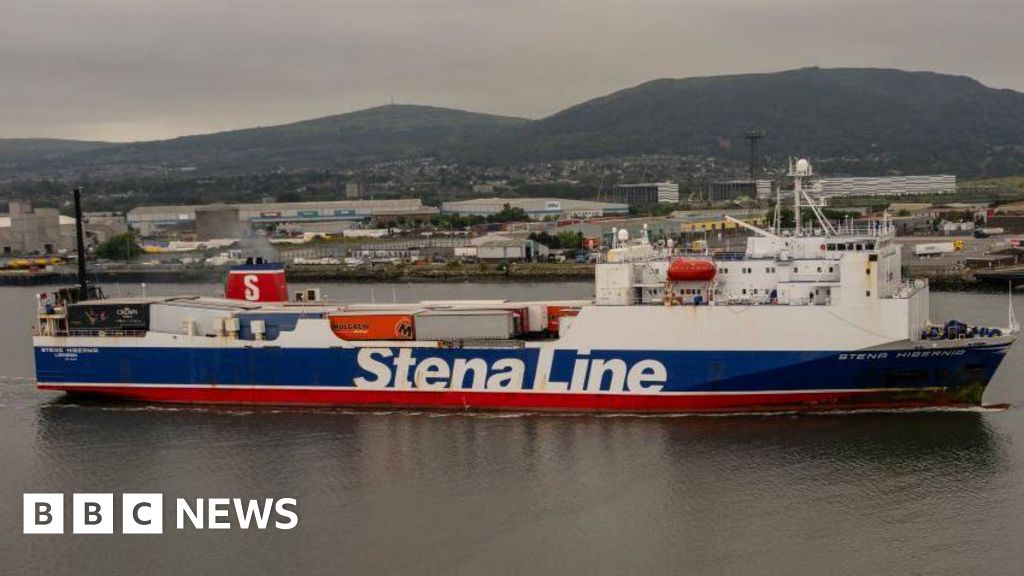Peter Titmuss/UCG/Universal Images Group via Getty Images
Parcel deliveries from Great Britain to Northern Ireland will be affected the most.
Some businesses in Northern Ireland are concerned about the next steps in the implementation of the region’s EU withdrawal agreement, due at the end of September.
The main impact will be on some parcel deliveries from England to Northern Ireland.
Business-to-business parcels will have to go through customs procedures for the first time, while parcel delivery companies will also have to register with a new Trusted Trader scheme.
The Northern Ireland Chamber of Commerce said the Government needed to respond to the looming changes and re-engage with the wider Brexit issue in Northern Ireland.
Getty Images
Purina pet food will continue to be sold in retail stores and wholesalers across Northern Ireland.
Pet food company Purina has already told customers it is ending its business-to-business distribution agreement in Northern Ireland, the News Letter reports.
“We regret to inform you that from Friday 6 September 2024, we will no longer be able to provide parcel deliveries of Purina pet food orders to professional breeders in Northern Ireland,” the company said.
“Purina pet food will continue to be available in retail stores and wholesalers across Northern Ireland and we will continue to explore new opportunities to reinstate our direct delivery service to breeders.”
“The government needs to continue to listen to the voices of businesses.”
Stuart Anderson, communications director at the Northern Ireland Chamber of Commerce, said clarity and urgent planning was needed about the movement of goods “as well as other issues such as the operation of trader support services after 2024 and the availability of veterinary medicines”.
“The government must continue to listen to businesses and keep its implementation under constant review,” he added.
“Economic growth is the government’s top priority and reducing red tape is crucial to achieving this goal.”
Getty Images
The UK Government said it was committed to implementing the Windsor Framework.
After Brexit, Northern Ireland effectively remained within the EU’s single market for goods.
It meant new checks and controls would be applied to goods sent from Great Britain to Northern Ireland, also known as the Irish Sea border.
This was originally set out in a UK-EU agreement known as the Northern Ireland Protocol, which was updated last year to become the Windsor Framework.
Under the original agreement, most parcels sent from Great Britain to Northern Ireland would have had to be declared at customs, but this was never implemented because businesses and the British government said it was not feasible.
The Windsor Framework aims to significantly simplify the original proposals and also include measures to give EU guarantees that goods will not enter the market illegally.
A UK government spokesman said the government was committed to implementing the framework in good faith and protecting the UK internal market.
“We continue to work with all stakeholders, including businesses and the EU, to ensure that its implementation is as smooth as possible,” it added.
Getty Images
Parcel companies that transport goods from UK businesses to consumers in Northern Ireland will be required to join the new Trusted Trader scheme.
There are no new requirements for consumer-to-consumer parcels and consumers should not notice any changes when buying from UK retailers.
But parcel companies transporting goods from UK businesses to consumers in Northern Ireland will have to join a new trusted trader scheme called the UK Carrier Scheme (UCS).
No customs declarations are required, but businesses will need to provide information to HMRC.
For example, you need to show that you have processes in place to distinguish whether a customer’s item is being sent to an individual or a business.
The main charge is levied on business-to-business parcels that need to use the UK Internal Market System (UKIMS).
This includes simplified customs declarations for goods that pose no risk of moving into the EU.
“At-risk” goods will require full customs clearance.
Businesses that only send parcels to consumers do not need to register with UKIMS.
Royal Mail, the UK’s largest parcel delivery company, said it was working closely with the government, customers and other stakeholders to ensure the flow of goods from Great Britain to Northern Ireland continues smoothly after the changes are implemented.
“Not for EU” sign
Another upcoming change is that a wider range of British food products will have to be labelled “not EU” when sold in Northern Ireland.
Under the Windsor Framework, food and drink sold by retailers in Northern Ireland will be subject to UK public health and safety standards rather than EU standards.
This means British traders sending food for sale to consumers in Northern Ireland will have few regular inspections and minimal paperwork.
The flip side of this is that by labelling British food products as “not for EU”, it is assuring the EU that products will not be mistakenly sold in its single market.
In the first phase, the labelling would be limited to pre-packaged meat and raw milk sent from Great Britain to Northern Ireland.
From October 1st, all milk and dairy products will have to be individually labelled at the product level.
The previous government had planned to extend “not for EU” labelling to the rest of the UK but later reconsidered that decision and held a consultation.
It is understood that the current Government is still considering the evidence from the consultation and legislation to implement these arrangements has not yet been advanced.



